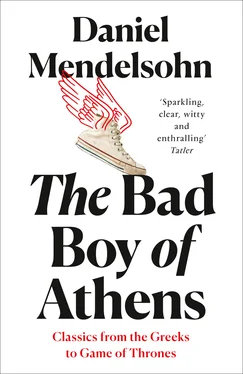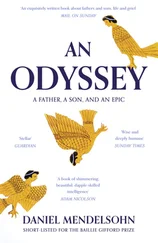It’s unlikely that Medea – Euripides’ Medea , that is, not the play that Deborah Warner staged – will have trouble surviving the grotesque, giggling, wrongheaded treatment it received on Broadway. If so, it wouldn’t be the first time that the playwright bounced back after some rough treatment. Soon after Aristophanes lampooned him (intentionally) in his Thesmophoriazousae , Euripides left town for good. His destination was about as far from Athens, culturally and ideologically, as you could get: the royal court of Pella, capital of the backwoods kingdom of Macedon, a country that would take another century to achieve world-historical status. (It’s where Alexander the Great was born.) He left, so the story goes, because he was disgusted by his city’s descent into demagoguery, intellectual dishonesty, political disorder, and defeat. But perhaps he was also smarting because of Thesmophoriazousae ; perhaps he was tired of being misunderstood.
And yet perhaps, too, there was time for one more effort; perhaps he might have the last laugh. Perhaps, from a burlesque, a deliberate misinterpretation, a pandering by a comedian to the common taste in order to achieve a glib success, something worthwhile might result. Let us imagine this aged poet as he leaves Athens and embarks on his difficult northward journey, turning an idea over in his mind – an idea that comes to him, as it happens, from Thesmophoriazousae itself. An all-female festival; a man eager to see what the women get up to, when the men aren’t watching. A grotesque foray into drag that convinces no one; a masquerade that ends in apprehension, and terrible peril. Not a bad idea for a play – not a comedy, this time around, but something terrible, something that will bring his citizen audience close to the core of what great theatre is about: plotting, disguise, recognition, revelation, violence, awful knowledge. He arrives in Macedon and gets to work. Three years later, the play is finished: Bacchae . By the time it is produced back home in Athens, winning its author one of his rare first prizes, Euripides is dead. But from the mockers, those who wilfully mistake his meanings, he has stolen a victory. This show, it is safe to say, will go on.
– The New York Review of Books , 13 February 2003
Конец ознакомительного фрагмента.
Текст предоставлен ООО «ЛитРес».
Прочитайте эту книгу целиком, купив полную легальную версию на ЛитРес.
Безопасно оплатить книгу можно банковской картой Visa, MasterCard, Maestro, со счета мобильного телефона, с платежного терминала, в салоне МТС или Связной, через PayPal, WebMoney, Яндекс.Деньги, QIWI Кошелек, бонусными картами или другим удобным Вам способом.












